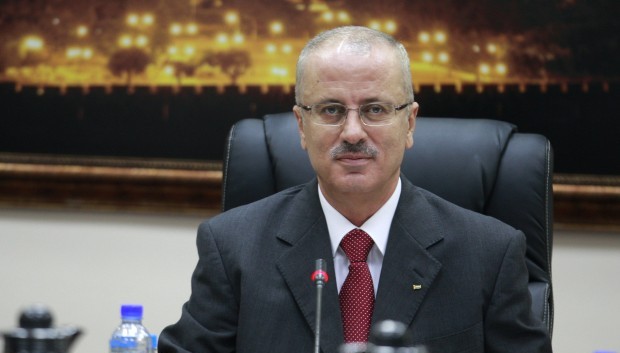
In this Tuesday, June 11, 2013 file photo, new Palestinian prime minister Rami Al-Hamdallah attends his first meeting of the new government cabinet in the West Bank city of Ramallah. (AP Photo/Majdi Mohammed, File)
Ramallah and London, Asharq Al-Awsat—Only two weeks after being sworn in as Palestine’s prime minister, Rami Al-Hamdallah submitted his resignation to Mahmoud Abbas, the president of the Palestinian Authority (PA) on Thursday.
An informed source told Asharq Al-Awsat that Hamdallah had submitted his resignation in person to Hussein Al-Araj, director of the PA president’s bureau.
The source, speaking on the condition of anonymity, emphasized that Hamdallah decided to quit office following disputes with his deputies. The prime minister had reportedly clashed with the deputy prime minister for economic affairs, Mohammed Mustafa, and the deputy prime minister for political affairs, Ziad Abu Amr. Both Mustafa and Abu Amr were appointed by President Mahmoud Abbas.
Abbas’ decision to appoint the deputies was in “violation of the prime minister’s powers,” the source added.
This is the first time the president of the Palestinian Authority has appointed deputies for the prime minister, a move which was explained as an attempt on the part of Mahmoud Abbas to undermine Hamdallah.
A senior Palestinian official dismissed Hamdallah’s decision to resign as “not serious,” claiming that he made the decision in protest against Mohammed Mustafa’s handling of the economic file.
The senior official, who spoke to Asharq Al-Awsat on the condition of anonymity, said: “The way [Hamdallah] submitted his resignation demonstrates that he is not serious.”
“Had he been serious, he would have directly submitted his resignation to Mahmoud Abbas rather than send the letter of resignation to one of president’s members of staff,” the senior official added.
For its part, Hamas said that Hamdallah’s resignation is “evidence that individual moves remain weak and useless and do not resolve Palestine’s domestic problems.”
Fawzi Barhoum, spokesman for Hamas, said the right solution would be to “implement all the terms of the reconciliation agreement” instead of forming several governments, stressing the need to form a consensus government in Palestine.
Hamdallah will remain in office until Abbas decides whether to accept or reject his resignation. If Abbas accepts the resignation, he will have to form a new government within seven weeks. However, if Abbas refuses to accept the resignation, Hamdallah will have to remain in office and form a consensus government in three months’ time.
